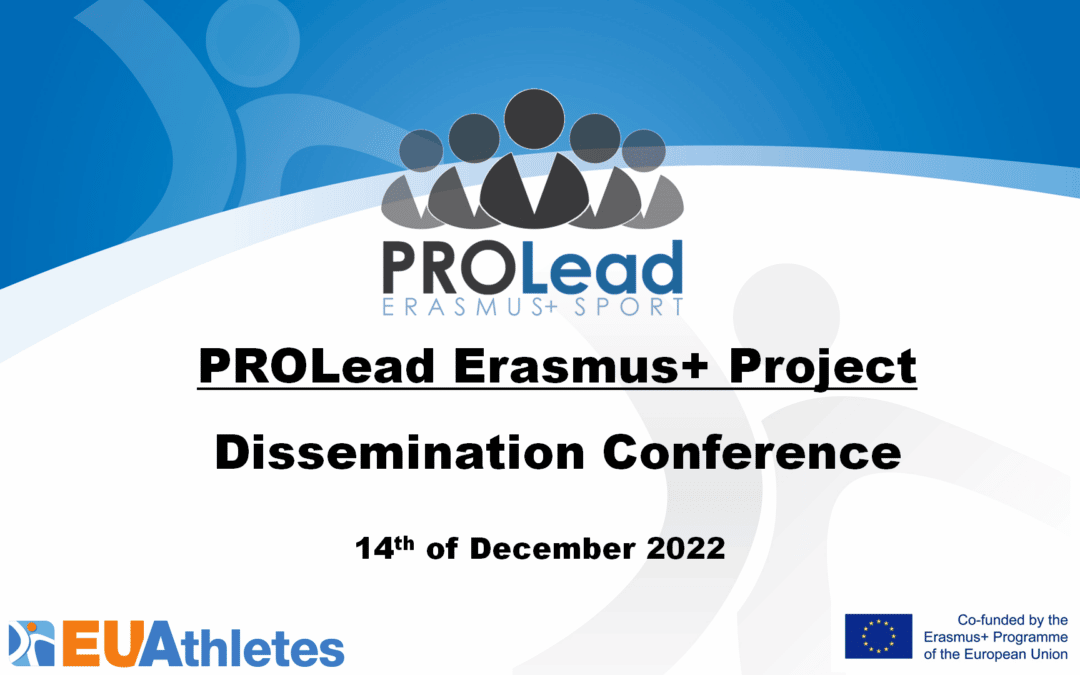
Dec 14, 2022
This morning, the Dissemination Conference of PROLead project has taken place online, gathering over 170 participants from player associations, sport organisations, dual career providers, universities and other organisations. The meeting was an opportunity to share the experiences and results of the project, good practices and discuss the topic of leadership education and player development.
PROLead is a collaborative partnership project co-funded by the Erasmus+ Programme of the European Union and coordinated by European Elite Athletes Association (EU Athletes) with German Sport University Cologne and 8 player associations from different countries and sports (GPA, RPI, PPF, FNASS, UBE, TCA, AJFS, AJJV) as partners. Focusing on the topic of dual careers of athletes, the aim of the project was to enhance leadership skills of athletes, as well as volunteers and staff of player associations, by designing and implementing leadership courses at the European and national level.
The conference was kicked off by Tom Parsons, the CEO of Gaelic Players Association who shared his leadership journey in a keynote speech. Presentations of the PROLead project by Paulina Tomczyk, General Secretary of EU Athletes, and the project results: Desktop Research and Literature Review of Leadership Education for Athletes by Sebastian Uhrich from German Sport University Cologne and the European Leadership Course and Good Practice Guide by Eamonn Murphy from Gaelic Players Association followed.
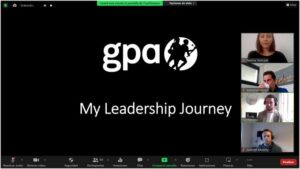
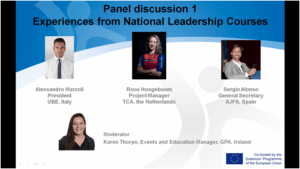
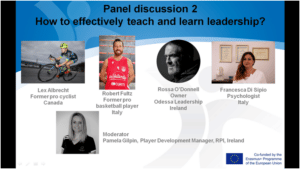
The participants also had an opportunity to hear from two panels. First one, moderated by Karen Thorpe from Gaelic Players Association, focused on the experiences of player associations who designed and delivered National Leadership Courses for their players during the PROLead project. Alessandro Marzoli from Union des Basketteurs Europeens, Roose Hoogeboom from the Cyclists Alliance and Sergio Alonso from Asociacion de Jugadores de Futbol Sala shared insights into their work. In the second panel, two athletes (Lex Albrech and Robert Fultz) and two facilitators (Rossa O’Donnell and Francesca Di Sipio) engaged in a discussion about how to best teach and how to learn leadership, moderated by Pamela Gilpin from Rugby Players Ireland.
The Conference was concluded by Natalia Orive, the Vice President of EU Athletes, who emphasised the work that EU Athletes has been doing to strengthen the leadership within the player association movement, and the importance of helping athletes to realise their potential and strength as leaders.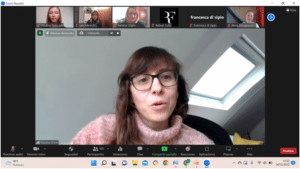
Paulina Tomczyk, the Project Manager of PROLead, said ‘I am very proud of the work that the project team has completed over the last 3 years. We have managed to bring positive results for the athletes, partner organisations and other EU Athletes members. Today’s conference was also an opportunity to share and exchange with other player associations and various stakeholders, with an ultimate goal to best support athlete development and leadership education.’
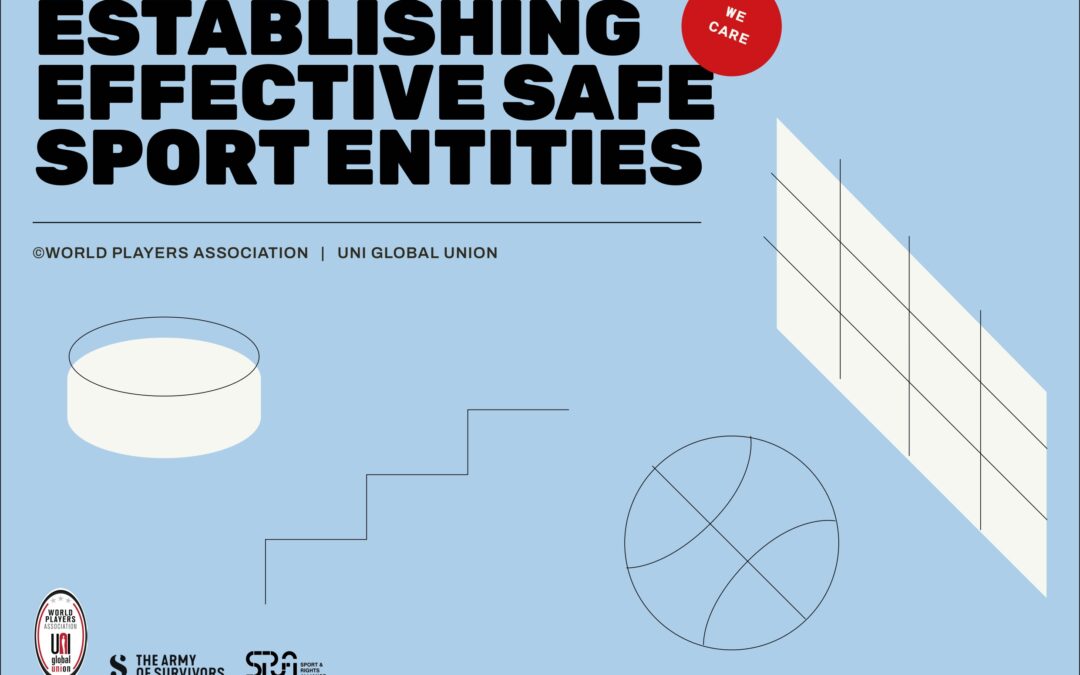
Dec 1, 2022
As an affiliate of the World Players Association, EU Athletes supports today’s launch of “Establishing Effective Safe Sport Entities”, a concise guide on the key principles and essential functions of entities established to address and remedy the scourge of abuse in sport. Developed together with The Army of Survivors and the Sport & Rights Alliance, the guide provides sports bodies, governments, player associations, civil society organisations, and other stakeholders with a clear benchmark to ensure safe sport entities are able to prevent, investigate and respond to abuse in a manner that protects the safety, humanity, dignity and voice of impacted athletes.
Recent and continuing revelations of endemic, appalling and systemic abuse of athletes, often fostered by enabling cultures of sporting norms, nepotism, cover-up, and retaliation, have triggered a rush to establish safe sport initiatives. While potentially an important step , these processes commonly have significant shortcomings in purpose, culture, capacity, expertise, and transparency – often exacerbating harm for victims and survivors. Athletes turning to such entities report a lack of support and safety, an absence of trauma-informed approaches, ineffective reporting procedures, a legalistic and adversarial system of dispute resolution, and gaps when it comes to meaningful reparation and remedy.
Athlete trust – essential to the success of any safe sport initiative – has too often been destroyed by being forced into a system principally designed to protect the reputation of the sports body itself as opposed to identifying the justice needs of victims and systemic causal factors. Some sports bodies and governments have made the dangerous assumption that the already problematic sports integrity framework – designed around challenges such as anti-doping and match-fixing – is capable of addressing the particular challenge of abuse and the sporting environments which enable it.
Based on these experiences and coupled with the knowledge of experts in the field of trauma and abuse, the guide articulates six key principles that need to be embedded in the establishment and operations of safe sport entities to ensure that initiatives can deliver justice and support for survivors:
- Human Rights-Based
- Survivor-Centred
- Independency & Accountability
- Safety & Accessibility
- Meaningful Stakeholder Engagement
- Effective Remedy
In addition, the guide identifies five essential functions that such entities need to fulfil in order to respond to the needs of survivors and drive the necessary systemic change to achieve the stated safe sport purpose:
- Support
- Reporting
- Investigation
- Remedy
- Prevention
The released guidance comes at a critical point in time, as FIFA is looking at establishing an structure on a global and multisport level, and other national-level initiatives are underway in several countries under the guidance of national governments.
EU Athletes General Secretary Paulina Tomczyk said:
“Every case of athlete abuse is one too many. Sport organisations, governments and other stakeholders need to recognize their responsibility and deal with the systemic abuse in sport head on. Establishing safe sport entities is a step in the right direction, but their structure and functioning need to be fit for purpose. With the Safe Sport Entity Guide, the player association movement is showing its committed to being a part of the solution and making sure that the protection of rights and integrity of athletes is a non negotiable priority.”
World Players Executive Director Brendan Schwab said:
“Abuse in sport is continuing to destroy the lives of thousands of players around the world. We cannot wait for the system to come up with a solution, as the system is part of the problem. There is an urgent need to establish new and carefully designed structures that can deal with these cases and meet the individual, collective and systemic justice needs of victims, survivors and athletes generally. This guide provides clear criteria to ensure that those initiatives can be effective, safe, trauma-informed, survivor-centred, and deliver the systemic change needed.”
The Army of Survivors Executive Director Julie Ann Rivers-Cochran said:
“While we agree that current safeguarding and reporting systems need to be revisited in order to prioritize athlete safety and wellbeing, our hope is that new entities being created are taking the right measures into account. By utilizing this guide, organizations have principles and key functions that will aid them in creating transparent and survivor-centered processes.”
Sport & Rights Alliance Director Andrea Florence said:
“To move forward, it is important that we learn from mistakes in the past. For too long we have seen processes and systems built to protect sport and its reputation. We need to finally start to focus on those most affected by the current failures: the athletes and survivors. For the effectiveness of any safe sport institution, it is absolutely critical to be based on meaningful, nonexploitative, safe and trauma-informed consultation with survivors.”
Establishing Effective Safe Sport Entities – Guide
Original press release by World Players Association
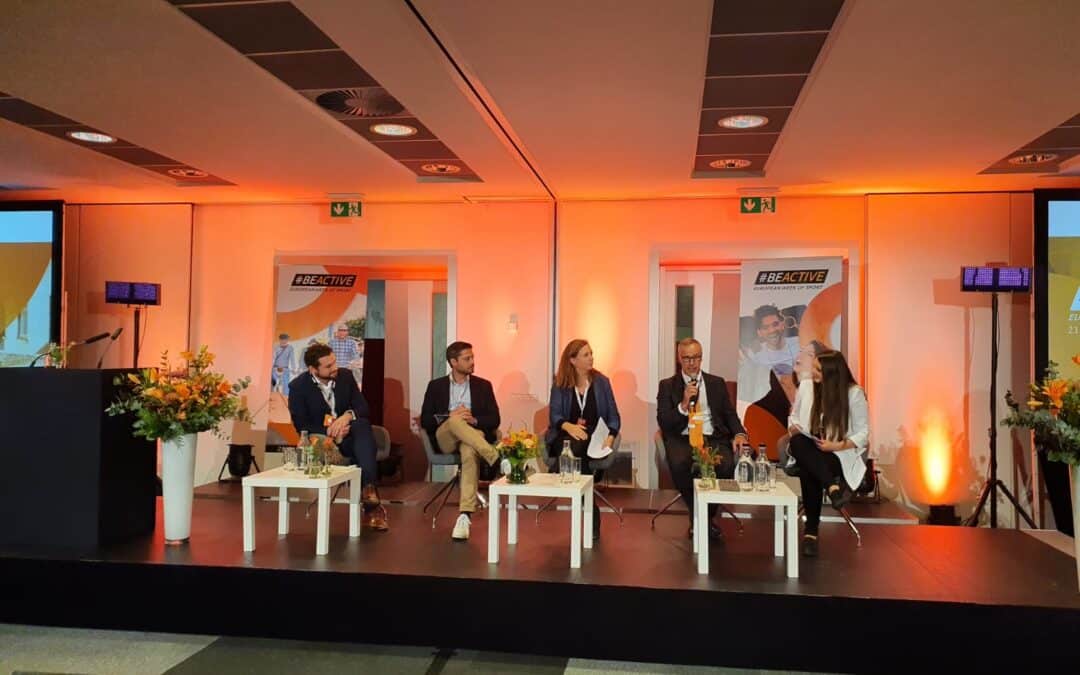
Sep 25, 2022
EU Athletes Board member Tom Parsons traveled to Prague earlier in this week to participate in the opening of the European Week of Sport 2022. Following an invitation from the European Commission, Tom was able to present EU Athletes campaign fulfiling the pledge supporting the #healthylifestyle4all initiative.
This event was a unique opportunity to present the work done by EU Athletes and its members during the last couple of weeks within the Athletes for #healthylifestyle4all campaign. By signing the pledge we have made the commitment to the European Commission to spread the message as much as possible and we believe the support of our players will tremendously help.
Tom Parsons

Sep 14, 2022
The HealthyLifestyle4All is the European Commission’s initiative that aims to link sport and active lifestyles with health, food and other policies. It showcases the European Commission’s commitment to promoting healthy lifestyles for all, across generations and social groups, noting that everyone can benefit from activities that improve health and well-being
To promote a broad outreach, uptake and ownership of healthy lifestyles across society, the European Commission wishes to involve sport movements at national, European and international level; state authorities (ministries), cities & regions (local governments) and civil society organisations of the EU Member States, the Erasmus+ programme countries, the Eastern Partnership and Western Balkans countries.
“Sport is the day to day life of the athletes we represent” said EU Athletes board member Camille DELZANT “We believe as an organisation that our members have a role to play to help spreading the message across that a healthy lifestyle has a lot of positive impact on people mental and physical wellbeing. You can start small, there is no need for fancy equipments. And she concluded “With our Union members we have gathered a great group of ambassadors to promote this really important message. Follow their tips and it won’t take very long before you see some benefits in your day to day life.
EU Athletes is a proud signatory of the pledge for #healthylifestyle4all initiative. We have committed to develop a communication campaign to raise awareness about the importance of healthy lifestyle, with participation of professional athletes from different countires and sports in Europe. Follow our social media plateforms to discover the videos of our members under the Athletes for #healthylifestyle4all.








